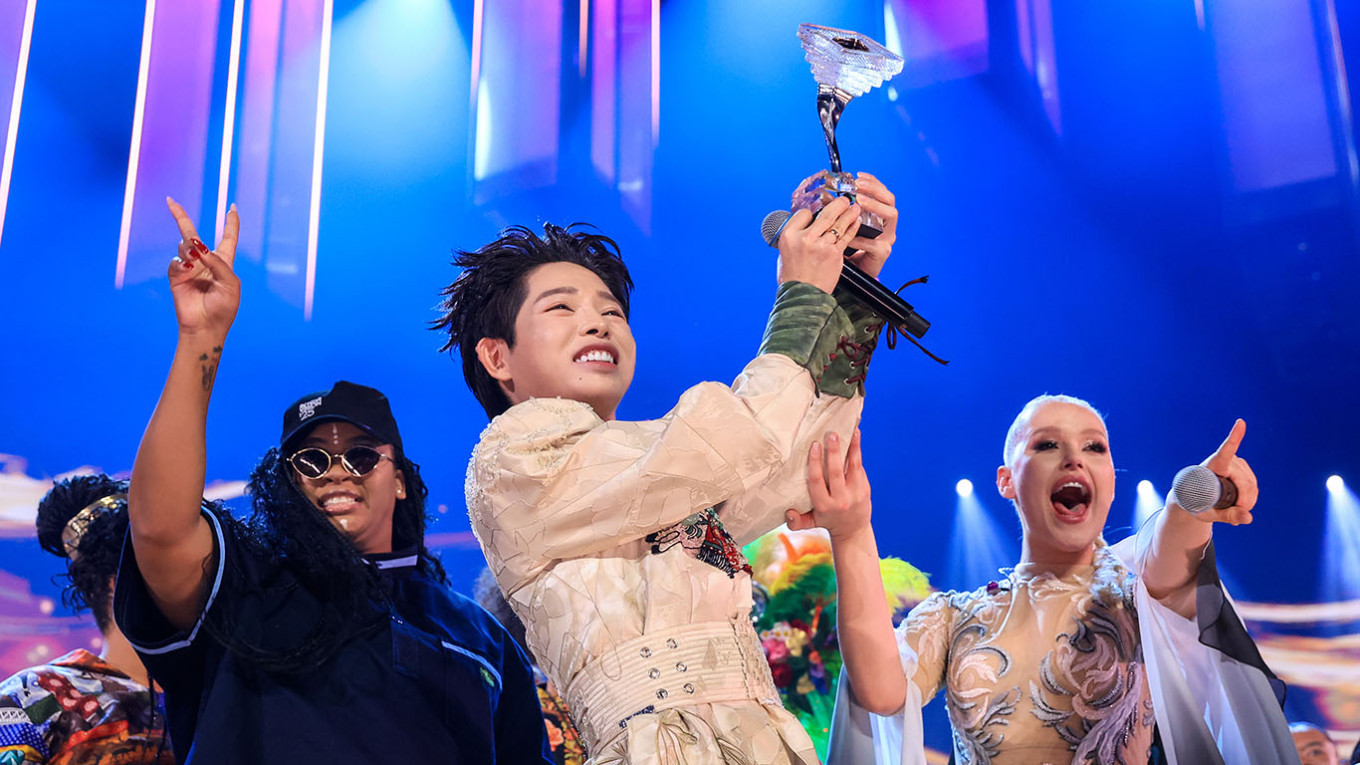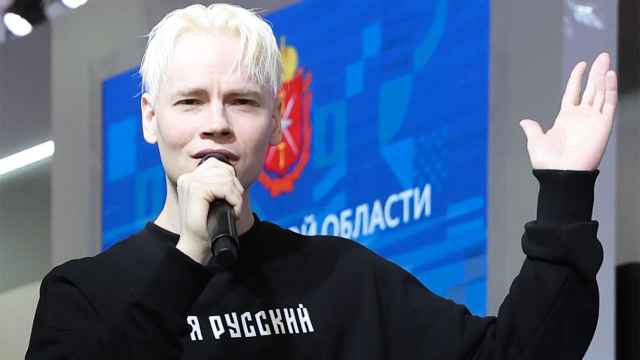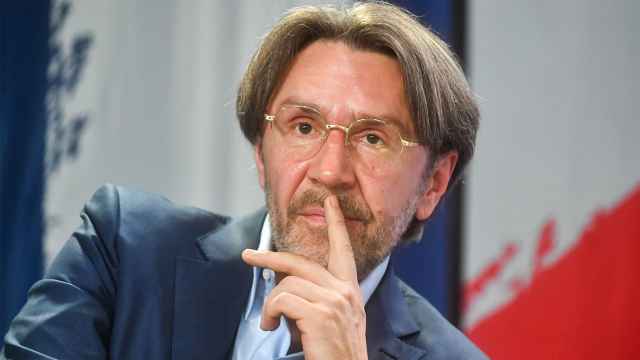Late in the evening on Sept. 20, Russia staged the Intervision contest, which Moscow proudly declared to be the heir to the musical events held irregularly since 1965 in the countries of the socialist bloc, with the participation of the U.S.S.R.
Claiming someone else’s achievements is nothing new. But during wartime, a propaganda spectacle with the participation of the few who either dared or had no choice but to attend looked like a staged self-exposure rather than triumph.
What can one say, when the winner of a contest in the land of “traditional values” turns out to be a young, openly gay Vietnamese man in a dress? Duc Phuc even bonded with the Belarusian entrant, Nastya Kravchenko, gifting her a Vietnamese hat with her portrait on it (though he gave similar gifts to every contestant). The Vietnamese, it seems, did their homework and charmed everyone in the room. And before the jury knew it, Phuc was on the winner’s pedestal — when really, in the eyes of pro-war patriots, he belongs behind bars!
Things also went awry with the United States — Russia’s tactical trump card in this whole story. First, Brandon Howard, known mostly for speculation about his possible kinship with Michael Jackson, refused to come. He helpfully announced that Vassy — the Greek-Australian singer Vassiliki Karagiorgos — would perform instead. But after the Australian authorities sent her an “official note” as a citizen of that country, Plan B also fell through.
The audience had to be told about “unprecedented political pressure,” and the U.S. ended up represented only by a jury member — hard rock vocalist Joe Lynn Turner, a noted fan of President Vladimir Putin and his Belarusian counterpart Alexander Lukashenko, married to a Belarusian and living long stretches outside Minsk. Otherwise, Russia would have faced embarrassment with Vassy too: she’s a longtime activist and a supporter of LGBTQ+ rights (which Russia still thinks is some kind of movement worth suppressing).
The geographic scatter of participants provoked grand statements. For example, TV host Yana Churikova said two hours before the show that the “whole planet Earth” was represented, to which host Dmitry Borisov happily confirmed: “Twenty countries!” There were actually 22 participants, once the United States dropped out. Incidentally, from hostile Europe, only three out of a possible 44 countries took part in Intervision. Out of 35 countries in the Americas, four participated. Africa also sent four, while Asia provided an impressive nine, including the eternal vassals of the former U.S.S.R., supplying the desired sense of closeness.
Russia desperately wants to live in this world, practically with its last strength, since tourism to Europe is only just beginning to grow, with a potential visa embargo threatening it. But even aside from the meager tourism, everything in Russia looks like ersatz Europe: from endless Anglicisms in speech and urban design to the nearby Skolkovo business school and the light show that served one obvious purpose — to mock Eurovision, which remains a thorn in the side of Russian patriots no matter how loudly they profess loyalty to India and China.
Beyond a few large countries like Brazil, nominally able to provide an audience, the rest fell into the category of dependent clients. Russia, with its self-important pout, cosplayed the “great Soviet power” once surrounded by various Third World countries while playing the anti-Western imperialism card. The current rulers couldn’t invent anything new. Neither could the organizers of the contest, which was staged under slogans of “peace in the whole world” — words that, in the current context, would almost qualify as “discrediting the army.”
“Intervision,” a smooth baritone with a faintly streetwise intonation explains in promotional clips on Channel One, “is not just about music; it’s about uniting peoples and friendship among nations, about culture without borders, about emotions everyone can understand.” The screen flashes scenes of Moscow — Red Square, VDNKh, Luzhniki stadium. Against this backdrop, people of all colors sang “Kalinka.” It was exactly like the Olympics, the World Youth Festivals and other staged celebrations from which never quite catapulted Russia to the heights it imagiens for itself.
A parade of unknowns — random foreigners and mostly hired migrant workers dressed in costumes evoking various corners of the globe. Although the word “peace” was uttered more often than necessary on a Russian television show in a country waging war against NATO via “Ukrainian fascists,” the contest itself avoided such slips.
The main theme of the songs was love, which — as we know — only blossoms in wartime, born of longing, hunger, despair and hopelessness.
The main object of the carefully staged comment was, without question, a man with the militaristic surname Dronov, better known by his stage name Shaman. In one of his speeches before his eccentric performance, he made a telling slip of the tongue, referring to the participating countries as “all 23 republics.” After all, harkening back to the Soviet Union is as necessary to today’s Russia as air. Without it — like without Putin — the country is doomed. Or so think those who are now irreparably ruining the country’s karma.
From the very first notes of the bombastic show, it was clear everything was going according to plan. Before the contestants, Dima Bilan and Polina Gagarina sang a song that once thrilled Soviet teens during perestroika. “Na Zare” (“At Dawn”) — the great hit by the band Alyans — was easily turned into a syrupy ballad. It served as a prelude to the propaganda simulation of a contest, staged to demonstrate Russia’s victory.
But even that picture was enough to show how Russia can come away with some kind of victory.
The problem was that many of the contestants turned out to be decent performers and bright professionals. Even though most of them sang either dreary pop or sanitized tourist-style folk, it was obvious that they outcompeted the so-called singer Shaman. So what did he do? He put forward a pompous and, in fact, deeply insulting display by asking the jury not to score his performance. “By the laws of hospitality,” he was obliged to yield victory to Russia’s guests. After all, Russia had “already won” simply by hosting the contest.
This naive colonial-style bravado permeates the entire worldview normalized in Russia. On the talk show before the contest, Kazakhstan’s entrant Yernar Sadirbayev explained why he performed under the pseudonym Amre — after Amre Kashaubayev, the founder of Kazakh musical theater.
It was unlikely that Borisov knew Kashaubayev had been killed by the Soviet secret police in 1934. But his instincts were sharp: as soon as Sadirbayev finished, he blurted out that his mentor on The Voice was the Russian (Eurovision alumnus) Dima Bilan. “Now we have someone to root for,” he concluded with satisfaction, before politely adding: “For everyone, of course!”
Back in the 1960s, when musical contests were held in Czechoslovakia and then, after the 1968 Soviet invasion, moved 10 years later to Sopot in Poland. Soviet participants managed — despite the propagandistic kitsch — to win prizes for songs like Alla Pugacheva’s “Kings Can Do Anything” or Nikolai Gnatyuk’s “Dance on the Drum.” And they shared spots with contestants from Finland and Spain. Even within the socialist bloc, that exchange raised the everyday cultural level of the average Soviet citizen.
Do today’s Russian TV heroes, noses in the air before people they do not even really consider human, dream of such things? More likely, they dream of Eurovision — the contest they can only beat in their sleep.
Incidentally, unlike Eurovision, the Russian contest abolished audience voting — a smart move. An honest tally of audience preferences would have created suspense — the very suspense that keeps people watching decadent Eurovision to the end. Heaven forbid that uncontrollable viewers might decide to vote for the wrong person. In Russia, everything is under control — not like Europe, with its eternal chaos and bearded women!
And yet, in the end, Duc Phuc not only took to the stage, but won. For that, surely, someone will be held responsible.
A Message from The Moscow Times:
Dear readers,
We are facing unprecedented challenges. Russia's Prosecutor General's Office has designated The Moscow Times as an "undesirable" organization, criminalizing our work and putting our staff at risk of prosecution. This follows our earlier unjust labeling as a "foreign agent."
These actions are direct attempts to silence independent journalism in Russia. The authorities claim our work "discredits the decisions of the Russian leadership." We see things differently: we strive to provide accurate, unbiased reporting on Russia.
We, the journalists of The Moscow Times, refuse to be silenced. But to continue our work, we need your help.
Your support, no matter how small, makes a world of difference. If you can, please support us monthly starting from just $2. It's quick to set up, and every contribution makes a significant impact.
By supporting The Moscow Times, you're defending open, independent journalism in the face of repression. Thank you for standing with us.
Remind me later.






